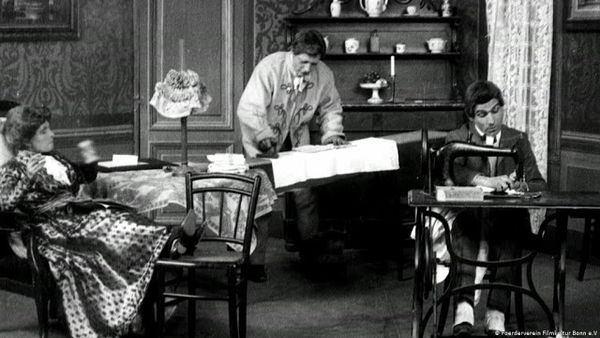Eye For Film >> Movies >> The Consequences Of Feminism (1906) Film Review
The Consequences Of Feminism
Reviewed by: Jennie Kermode

It's often said that the reason why some men fear feminism - and why, more widely, groups with power resist sharing it - is that, having always lived in a hierarchical world, they can't imagine any other model, so they assume that what women want is the kind of power over men that men have (or have historically had) over them. In this classic 1906 short, legendary filmmaker Alice Guy imagines what such a world might look like. It's a clever little piece perceived by some as anti-feminist, yet sharply satirical - and in suggesting that men would not ultimately stand for being treated in this way, it raises the question of why they expect women to do so.
The film presents us with a number of mundane scenarios transformed by the gender role reversal: a private club, a pub, a domestic space, a street through which men are pushing prams, a private bedroom. There's a hint of naughtiness about the latter in keeping with some of Guy's later work, and the mood throughout is playful despite a serious undercurrent. Whilst some have criticised the pronounced effeminate mannerisms of the male actors, this comes across as suggesting - 84 years before Judith Butler - that much of what we see as the expression of natural gender is in fact a performance. Guy's men perform to please their women and the women indulge their behaviour at times, mocking it at others. There's a darker subtext to the bedroom scene as the man uses such behaviours to try and deter the woman, who is brusque in her efforts to remove his clothes.
This reversal doesn't always work in the female characters' favour. In one scene, a group of women enjoying a night's drinking session are harangued by husbands who want them to come home. Elsewhere, men hug and chat and fuss over their children in a way that clearly gives them joy, from which the women are excluded - affirming that it's not just women who might benefit from change.
The real strength of the film is in the way it points up gender role differences that go unnoticed because people are so used to them - and it's disturbing how much their remains the case today. In one scene, a woman relaxes at home whilst a man does the ironing in the background and another carries away stacks of plates. As she exits, she knocks over a chair and doesn't even notice. This latter action is clearly a comic exaggeration, but it draws attention to what has gone before - to her casual assumption that the men will pick up after her. Because of the unfamiliar context, the ludicrousness of this is obvious, again inviting viewers to wonder why it's tolerated the other way round.
Simply yet handsomely constructed, witty and concise, this is an antique piece of art with real staying power and, sadly, far more contemporary relevance than most of us would like.
Reviewed on: 30 Sep 2020














